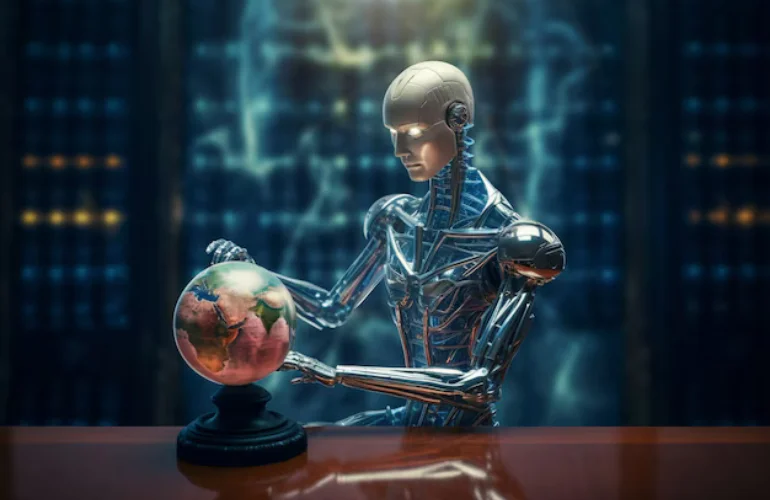Artificial intelligence death calculators have turned into a subject of interest as well as debate within the sphere of healthcare. Some of these AI-powered calculators merely intend to estimate the number of years left in a person’s life and other health-related possibilities with reference to numerous input parameters. Although it may seem like something that has materialized from a Hollywood movie, this is very much a fact, using an enormous amount of data and complex calculations to give recommendations that can affect people’s daily routine and health-related decisions.

How Does an Artificial Intelligence Death Calculator Work?
Most of the artificial intelligence death calculators will operate based on a number of factors that are unique to every person, ranging from previous illnesses to life styles and even genes. This data is then used by the AI to make some predictions regarding the risks of other health related events, including life expectancy. The forecasts are built on reasoning derived from examination of bigger data sets, whereby the AI finds out that this or that factor has an influence on mortality levels.
For instance, suppose a candidate has inherited cardiovascular or any other disease, he or she smokes and rarely exercises; then the ability of the AI to estimate the candidate’s lifespan would be low compared to an energetic person, who does not smoke, has no family history of chronic diseases, and consumes a balanced diet. The purpose of such calculators, therefore, is not to deliver a conclusive result but to prompt people into an emperor adjustment of their behavior.
The Ethical Debate Surrounding Artificial Intelligence Death Calculators
There has been a lot of discourse occasioned by the application of artificial intelligence based death calculators. In one respect, such tools may be viewed as an example of how people are given the information regarding their health and, thus, can be encouraged to change their habits and take proper care of themselves. At the same time, there are discussions of the psychological consequences of such forecasts. In fact, having an estimated ‘death date’ which perhaps might be so and so months or weeks from now plays more harm than a person could handle, thereby leading to anxiety and stress thus affecting their health.
Also, the reliability of such prognoses is the topic of hot debate. Where AI contains enormous data and makes forecasts, the forecasts are faithful to data and algorithms used. Due to biases in the data or a lack of data in general, the prediction made will not be useful to the person being predicted, instead it will mislead him or her.
The Potential Benefits of Using an Artificial Intelligence Death Calculator
Despite the controversies, there are some positive aspects of employing an artificial intelligence death calculator. The major useful effect is indeed in early risk detection. If people know what may reduce the number of years they can expect to live, they will make necessary changes to their lifestyles; through dietary modifications or clinician consultations for instance.
Similarly, these calculators could be helpful means to the healthcare providers in their field practices. The system could see doctors working with AI death calculators to gain the understanding of a patient’s risk factors in order to devise better treatment plans for the patient. This would result in an increase in the quality health of the patients and they could live longer than before.

How Accurate Are Artificial Intelligence Death Calculators?
Artificial intelligence death calculators work by several principles in that the accuracy of the forecast is pegged on the quality of the data, the type of algorithms used and the extent of information provided by the user. The accuracy may vary in different calculators depending on the way they were constructed as well as the data to be used.
But it has to be noted that these are estimated indicators and do not promise a certain result in business. It is a material type of which decisions can be made but should never be consulted as the only means of acquiring health information. It is always advisable to seek the advice of a doctor when considering one’s health and the likelihood of having a particular disease.
The Future of Artificial Intelligence Death Calculators in Healthcare
Since death calculators are still in their developmental stages, they will experience enhancements in the same way as the rest of artificial intelligence technology. Indeed, future studies could try to improve the predictions and increase the amount of detailed information as to what determines life expectancy and overall health. However, issues of ethics as well as the psychological effects shall also need to be considered as well.
In future, the artificial intelligence death calculators could be better incorporated into primary care systems as tools that could inform patient’s own health destinies. Whether they will evolve into everyday instruments in healthcare or not – it is yet to be seen; but one thing is perfectly clear – the usefulness of such devices is evident.

How reliable are artificial intelligence death calculators?
It is important to note that AI death calculators give projections from the information in their possession. They can be beneficial, but their reliability can only be as good as the data and the equations employed. They should not be solely used to acquire information about one’s health.
Can an artificial intelligence death calculator predict the exact date of death?
No, these calculators do not describe the sure date or moment of one’s death. They give out statistical projections which are drawn with the help of risk factors and statistical processing of data; however, they do not take into consideration all factors affecting mortality.
What factors do artificial intelligence death calculators consider?
These calculators often presuppose data like the patient’s medical history, possible unhealthy habits, and or family health disorders, genealogical history, and occasionally ecology to forecast life span and health conditions.
Are there any risks associated with using an artificial intelligence death calculator?
There are certain risks that were mentioned, including possible psychological consequences, for instance, stress or anxiety connected with the receipt of a predicted lifespan. However, there is a danger of making wrong recommendations if the data collected is flawed in some way or another.
How can I use the results from an artificial intelligence death calculator?
It can be helpful to respond to and monitor specific aspects, as well as to use the results in order to make alterations to lifestyle which would reduce the risk of certain health issues occurring. But the general advice and treatment should be provided by a healthcare worker.
Conclusion
Other areas of AI concern include the death calculators which are innovative practices that combine technology and health, forecasting possible health situations and longevity. As tools with potential for precise medicine and screening of early probability of diseases, they nonetheless give rise to strict moral and psycho-emotional reflections. Just like any other tool, they should be well-utilized with caution and health issues should always be checked with your doctor or any other healthcare provider in addition to the results provided by these AI driven calculators.

